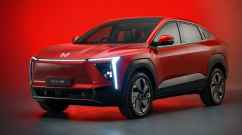Branding is key for success in the competitive world of car dealership companies. Establishing a strong brand identity sets you apart, attracts customers, and drives growth. In this guide, we'll walk through the steps to effectively brand your dealership, from defining your identity to implementing strategies for success.
Importance of Branding for Car Dealership Company
Effective branding is super important for car dealerships to succeed in the tough competition. Having a strong brand helps dealerships stand out from the crowd. This means they can catch the eye of customers who like what they offer and share their values. By having a unique logo, messaging, and overall look, dealerships can make themselves memorable. When dealerships have a clear brand identity, it helps them attract loyal customers and grow their business.
Builds Trust and Loyalty Among Customers:
A well-established brand instills confidence and trust in consumers, assuring them of the dealership's reliability and credibility. This trust is built through consistent branding across different touchpoints, demonstrating the dealership's commitment to quality, transparency, and customer satisfaction. By maintaining a cohesive brand experience, dealerships can cultivate customer loyalty and strengthen their reputation in the market.
Dealership's Reputation and Customer Experience:
Branding serves as a reflection of the dealership's values, culture, and commitment to excellence. A strong brand identity sets clear expectations for the customer experience, influencing perceptions of service quality, professionalism, and integrity. Positive brand associations contribute to a dealership's reputation, driving word-of-mouth referrals and repeat business. Through consistent branding efforts, dealerships can effectively communicate their values, shape customer perceptions, and ultimately enhance their overall reputation and success in the market.
Step 1: Define Your Brand Identity
Crafting a distinct brand identity is the foundation of success for car dealership companies. This step focuses on understanding your target audience, shaping your brand story, and positioning your dealership uniquely in the market.
Identify Your Target Audience
- Conduct market research to understand demographics, preferences, and behaviors.
- Analyze data to pinpoint the characteristics and needs of your ideal customers.
- Use tools such as surveys, focus groups, and customer interviews to gather insights.
- Segment your audience based on factors such as age, income, lifestyle, and buying behavior.
Craft Your Unique Brand Story
- Determine the dealership's mission, values, and personality.
- Reflect on what sets your dealership apart and what values it stands for.
- Develop a narrative that authentically communicates your brand's story and resonates with your target audience.
- Highlight memorable experiences, success stories, or milestones that showcase your dealership's journey.
Position Your Brand
- Analyze competitors to identify whitespace opportunities.
- Study competitors' branding strategies, messaging, and market positioning.
- Identify gaps or unmet needs in the market that your dealership can address.
- Define your dealership's unique selling proposition (USP) and competitive advantage.
- Emphasize what makes your dealership different and better than alternatives in the market.
- Clearly articulate the value proposition that your dealership offers to customers.
Step 2: Conduct Market Research
It is crucial to analyze competitors' strategies and consumer behavior to create an effective brand. By studying the competition and consumer trends, you can identify areas for differentiation and customize your branding efforts to better meet your target audience's needs.
Analyze the Competitive Landscape
- Identify key competitors and their branding strategies.
- Research competitors' brand positioning, messaging, and visual identity.
- Assess competitors' strengths and weaknesses in the market.
- Conduct a SWOT analysis (Strengths, Weaknesses, Opportunities, Threats) to evaluate your dealership's competitive position.
- Identify opportunities for differentiation and areas where your dealership can excel.
Understand Consumer Behavior
- Analyze purchasing trends, preferences, and pain points among your target audience.
- Use market research tools to gather data on consumer behavior, such as online surveys, focus groups, and customer interviews.
- Identify common challenges or obstacles that customers face during the car-buying process.
- Gather insights on customer expectations, desires, and motivations when interacting with car dealerships.
- Understand the factors that influence customers' decision-making process, such as price, brand reputation, and customer service.
Step 3: Develop Your Brand Elements
Crafting a strong brand identity is essential for standing out in the competitive automotive market. This step focuses on creating visually appealing and cohesive brand elements that resonate with your audience and reflect your dealership's personality.
Design Your Visual Identity
To brand your car dealership effectively, begin by designing a memorable logo that embodies your brand's personality. Next, select a consistent color palette and typography for all branding materials. Develop visual assets like imagery and graphics that align with your brand identity. Consider exploring additional resources and services offered by Car Media for tailored branding and marketing solutions specifically designed for car dealership companies.
Establish Brand Guidelines
Establish clear brand standards to maintain consistency in design and messaging. Define strict rules for using logos, fonts, colors, and imagery across all channels. Ensure your brand guidelines reflect your dealership's values and appeal to your target audience. Explore Car Media's resources for customized branding and marketing solutions tailored to car dealership companies.
Step 4: Craft Your Messaging
Crafting effective messaging is crucial for communicating your dealership's value proposition to your target audience. This step involves defining your value proposition, developing key messages, and ensuring consistency across different marketing channels.
Define Your Value Proposition:
Clearly articulate the benefits and value your dealership offers to customers. Highlight what sets your dealership apart from competitors and why customers should choose your services.
Develop Key Messages:
Develop key messages that resonate with your target audience's needs and aspirations. Tailor your messaging to address pain points and emphasize the unique advantages of your dealership.
Tailor Messaging for Different Channels:
Adapt messaging to suit various marketing channels, including your website, social media platforms, and advertising campaigns. Customize your messaging to fit the tone and expectations of each channel.
Ensure Consistency Across Platforms:
Maintain consistency in tone, voice, and brand positioning across all communication platforms. Ensure that your messaging reinforces your brand identity and values, regardless of the platform or medium.
Step 5: Implement Your Brand Strategy
Implementing your brand strategy involves aligning internal culture with brand values and executing branding consistently across all touchpoints.
Align Internal Culture with Brand Values:
- Train staff to embody the dealership's brand values and deliver a consistent customer experience.
- Foster a culture that reflects the brand's identity and mission, ensuring that every employee understands and embraces the brand's values.
Execute Branding Across Touchpoints:
- Implement branding elements consistently across all customer touchpoints, including physical locations, online platforms, and marketing materials.
- Ensure that the brand experience is seamless from initial contact to post-purchase interactions, maintaining consistency in messaging, visuals, and customer service.
Step 6: Measure and Iterate
Measuring the effectiveness of your branding efforts is crucial for continuous improvement. This step involves establishing key performance indicators (KPIs), analyzing data, and using insights to refine your branding strategies.
Establish Key Performance Indicators (KPIs):
- Define metrics to track the effectiveness of branding efforts, such as brand awareness, engagement, and customer satisfaction.
- Set benchmarks to measure progress and success over time, allowing you to track improvements and identify areas for growth.
Analyze Data and Feedback:
- Collect and analyze data from various sources, including website analytics, social media insights, and customer feedback.
- Use insights gained from data analysis to identify areas for improvement and refine branding strategies iteratively.
- Adjust your branding tactics based on feedback from customers and stakeholders, ensuring that your strategies align with evolving market trends and customer preferences.
Common Question And Answer
Q: Why is branding important for car dealership companies?
A: Branding is vital for car dealership companies because it helps them stand out in a competitive market, build trust with customers, and shape their reputation. Strong branding can also foster customer loyalty and drive business growth.
Q: How can branding benefit car dealership companies?
A: Branding benefits car dealership companies by differentiating them from competitors, establishing a positive reputation, and creating memorable experiences for customers. It can also increase brand recognition, customer loyalty, and ultimately, sales.
Q: What steps are involved in branding a car dealership company?
A: Branding a car dealership company typically involves steps such as defining the brand identity, conducting market research, developing brand elements, crafting messaging, implementing the brand strategy, and measuring performance to iterate and improve.
Q: Are there any tools or resources available to help with branding for car dealership companies?
A: Yes, there are several tools and resources available, including design software like Canva for creating branding materials, marketing platforms like HubSpot for managing campaigns, and guides and books on branding and marketing tailored to the automotive industry. Additionally, companies like Car Media offer specialized services and resources for branding and marketing solutions tailored to car dealership companies.
Q: How can branding help car dealership companies differentiate themselves in the market?
A: Branding allows car dealership companies to establish a unique identity that sets them apart from competitors. By defining their values, personality, and unique selling proposition, dealerships can effectively communicate what makes them different and why customers should choose them over other options.
Q: What role does consistency play in branding for car dealership companies?
A: Consistency is essential in branding for car dealership companies as it helps reinforce brand identity and build trust with customers. Consistent messaging, visual elements, and customer experiences across all touchpoints create a cohesive brand image and ensure that customers know what to expect from the dealership.
Q: How can branding impact customer loyalty and retention for car dealership companies?
A: Strong branding can foster customer loyalty and retention for car dealership companies by creating positive associations with the brand and building emotional connections with customers. When customers feel a sense of trust and alignment with the dealership's brand values, they are more likely to remain loyal and return for future purchases and services.
Q: What are some common challenges faced by car dealership companies when it comes to branding?
A: Some common challenges include standing out in a crowded market, effectively communicating value to customers, maintaining consistency across multiple locations or channels, and adapting to changes in consumer preferences and market trends. Overcoming these challenges requires careful planning, creativity, and a deep understanding of the target audience.
Final Words
Creating a strong brand identity is crucial for car dealership companies. It helps them stand out in a highly competitive market, establishes trust with customers, and shapes their reputation. By investing in a consistent and recognizable brand, dealerships can effectively communicate their value proposition, engage customers, and ultimately drive business growth.
Additional Resources
These resources offer valuable insights, tools, and guidance for car dealership companies looking to enhance their branding and marketing efforts.
Branding and Marketing Resources:
- Car Media: Explore additional resources and services tailored to branding and marketing solutions for car dealership companies.
Tools and Templates:
- Canva: Offers customizable templates for creating logos, marketing materials, and visual assets aligned with your dealership's brand identity.
- HubSpot Marketing Hub: Provides tools for creating and managing marketing campaigns, tracking performance metrics, and generating leads.
Further Reading Materials:
- The Car Dealer's Guide to Digital Marketing: A comprehensive guide to digital marketing strategies tailored to car dealership companies.
- Brand Aid: A Quick Reference Guide to Solving Your Branding Problems and Strengthening Your Market Position: Offers insights and strategies for building and strengthening brand identity in the automotive industry.













